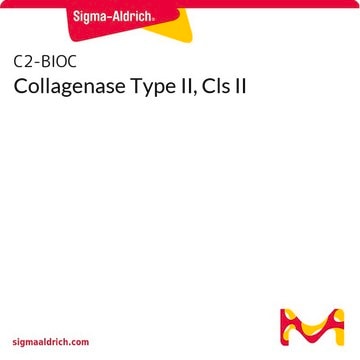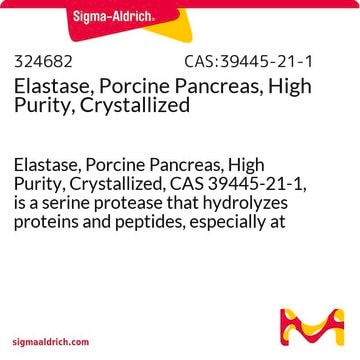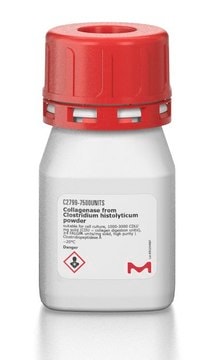V900892
Collagenase from Clostridium histolyticum
Type II, Vetec™, reagent grade, powder, ≥125 CDU/mg solid
Synonym(s):
Clostridiopeptidase A
Sign Into View Organizational & Contract Pricing
All Photos(2)
About This Item
Recommended Products
grade
reagent grade
product line
Vetec™
form
powder
specific activity
≥125 CDU/mg solid
storage temp.
−20°C
Looking for similar products? Visit Product Comparison Guide
Application
Collagenase from Clostridium histolyticum may be used for the isolation of cells from many types of animal tissue. VETEC Collagenase Type II has higher clostripain activity, and is suggested for bone, heart, liver, thyroid and salivary primary cell isolations.
Biochem/physiol Actions
Collagenase is activated by four gram atom calcium per mole enzyme. It is inhibited by ethylene glycol-bis(beta-aminoethyl ether) - N, N, N′,N′-tetraacetic acid, beta-mercaptoethanol, glutathione, thioglycolic acid and 8-hydroxyquinoline.
Quality
Also contains clostripain, nonspecific neutral protease, and tryptic activities.
Unit Definition
One collagen digestion unit (CDU) liberates peptides from collagen from bovine achilles tendon equivalent in ninhydrin color to 1.0 μmole of leucine in 5 hours at pH 7.4 at 37 °C in the presence of calcium ions. One FALGPA hydrolysis unit hydrolyzes 1.0 μmole of furylacryloyl-Leu-Gly-Pro-Ala per min at 25°C. One Neutral Protease unit hydrolyzes casein to produce color equivalent to 1.0 μmole of tyrosine per 5 hr at pH 7.5 at 37°C. One Clostripain Unit hydrolyzes 1.0 μmole of BAEE per min at pH 7.6 at 25°C in the presence of DTT.
Legal Information
Vetec is a trademark of Merck KGaA, Darmstadt, Germany
Signal Word
Danger
Hazard Statements
Precautionary Statements
Hazard Classifications
Eye Irrit. 2 - Resp. Sens. 1 - Skin Irrit. 2 - STOT SE 3
Target Organs
Respiratory system
Storage Class Code
11 - Combustible Solids
WGK
WGK 1
Flash Point(F)
Not applicable
Flash Point(C)
Not applicable
Certificates of Analysis (COA)
Search for Certificates of Analysis (COA) by entering the products Lot/Batch Number. Lot and Batch Numbers can be found on a product’s label following the words ‘Lot’ or ‘Batch’.
Already Own This Product?
Find documentation for the products that you have recently purchased in the Document Library.
Customers Also Viewed
Rong Yang et al.
ESC heart failure, 8(5), 3935-3946 (2021-06-25)
Calcific aortic valve disease (CAVD) is frequent in the elderly. Telocytes (TCs) are implicated in intercellular communication by releasing extracellular vesicles (EVs). This study investigated the role of TC-EVs in aortic valve calcification. TCs were obtained and identified using enzymolysis
Lubov Mitrofanova et al.
Oncotarget, 11(4), 322-346 (2020-02-18)
Telocytes (Tcs) and pericytes (Pcs) are two types of perivascular interstitial cell known to be widespread in various organs and tissues, including the brain. We postulated that Tcs and Pcs may be involved in glioblastoma (GBM) neovascularization. Morphological study of
Leptin differentially regulates endochondral ossification in tibial and vertebral epiphyseal plates.
Xiaomiao Li et al.
Cell biology international, 42(2), 169-179 (2017-10-06)
Longitudinal bone growth is governed by a complex network of endocrine signals including leptin. In mouse, leptin deficiency leads to distinct phenotypes in bones of the limb and spine, suggesting the appendicular and axial skeletons are subject to differential regulation
Xuchang Liu et al.
Journal of orthopaedic surgery and research, 14(1), 470-470 (2020-01-01)
Platelet-rich plasma (PRP) provides a nonsurgical approach for treating osteoarthritis (OA). Exosomes that play vital roles in intercellular communication have been studied extensively. Here, we investigated the therapeutic potential and molecular mechanism of exosomes derived from PRP (PRP-Exos) in alleviating
Chen Mei et al.
Frontiers in veterinary science, 8, 744032-744032 (2021-10-30)
Canine mammary tumors (CMTs) have histopathological, epidemiologic and clinical characteristics similar to those in humans and are known to be one of the best models for human breast cancer (HBC). This research aimed to describe a newly established canine cell
Our team of scientists has experience in all areas of research including Life Science, Material Science, Chemical Synthesis, Chromatography, Analytical and many others.
Contact Technical Service





![N-[3-(2-Furyl)acryloyl]-Leu-Gly-Pro-Ala](/deepweb/assets/sigmaaldrich/product/structures/805/876/96b5fb57-71c8-4c6b-b5d2-fafe7374cd85/640/96b5fb57-71c8-4c6b-b5d2-fafe7374cd85.png)





